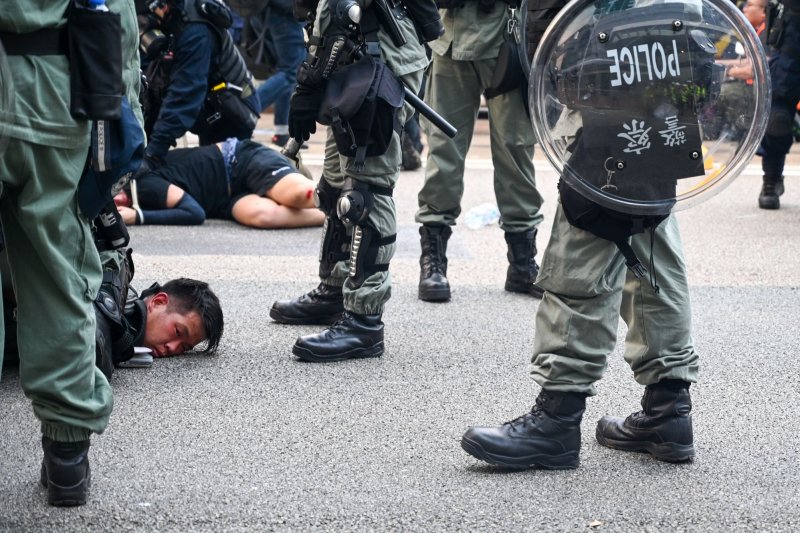
Riot police arrest a protester during an anti-government rally in Hong Kong on September 29, 2019.
File Photo by Thomas Maresca/UPI | License Photo
Nov. 4 (UPI) -- Hong Kong's top appellate court delivered a landmark ruling on Thursday that rejected government efforts to prosecute dissident activists who weren't physically present at an unlawful event or assembly.
The Court of Final Appeal struck down a lower court ruling that said Hong Kong authorities can punish activists as primary offenders, even if they didn't physically attend protests, assemblies or riots that violate the island's national security law.
The lower court had said the prosecutions were legal under the common law doctrine of "joint enterprise,' which says secondary offenders can be convicted on the same charge as primary offenders.
The decision Thursday by the five-judge appellate court, which was unanimous, concluded that the doctrine cannot be applied to rioting and cases of unlawful assembly. Physically participating in the unlawful events, the court said, is a "centrally important element" of the law.
The court said in its ruling that persons not present at illegal events can only be charged with conspiracy or ancillary offenses, such as aiding and abetting, incitement and assisting an offender.
The question wound through the courts after mass demonstrations in Hong Kong in 2019 and 2020 that opposed various issues such as police brutality, a controversial extradition law and the national security law itself, which has been used to punish dissidents critical of the Chinese government and those seeking independence from Beijing.
Thursday's ruling stemmed from appeals filed by pro-democracy activists Lo Kin-man and Henry Tong, who were charged for unrest that accompanied protests in 2016 and 2019.
Nov. 4 (UPI) -- Hong Kong's top appellate court delivered a landmark ruling on Thursday that rejected government efforts to prosecute dissident activists who weren't physically present at an unlawful event or assembly.
The Court of Final Appeal struck down a lower court ruling that said Hong Kong authorities can punish activists as primary offenders, even if they didn't physically attend protests, assemblies or riots that violate the island's national security law.
The lower court had said the prosecutions were legal under the common law doctrine of "joint enterprise,' which says secondary offenders can be convicted on the same charge as primary offenders.
The decision Thursday by the five-judge appellate court, which was unanimous, concluded that the doctrine cannot be applied to rioting and cases of unlawful assembly. Physically participating in the unlawful events, the court said, is a "centrally important element" of the law.
The court said in its ruling that persons not present at illegal events can only be charged with conspiracy or ancillary offenses, such as aiding and abetting, incitement and assisting an offender.
The question wound through the courts after mass demonstrations in Hong Kong in 2019 and 2020 that opposed various issues such as police brutality, a controversial extradition law and the national security law itself, which has been used to punish dissidents critical of the Chinese government and those seeking independence from Beijing.
Thursday's ruling stemmed from appeals filed by pro-democracy activists Lo Kin-man and Henry Tong, who were charged for unrest that accompanied protests in 2016 and 2019.
No comments:
Post a Comment